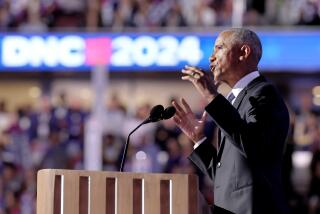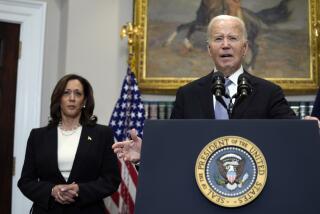Brown Shows Flair for Upstaging Rivals : Democrats: But some party regulars fear that his attacks on competitors during the TV debate will weaken the overall effort against the Republicans.
- Share via
The presidential campaign of former California Gov. Edmund G. (Jerry) Brown Jr. may have little money, just a skeleton staff and only limited signs of support in the crucial early primary states.
But as Brown demonstrated with his acerbic and eccentric performance in Sunday night’s nationally televised debate among the Democratic presidential contenders, he is a candidate with a strong ability to command the spotlight.
Much as he did when the party’s candidates gathered for their first joint appearance before the AFL-CIO last month, Brown became the focal point of the debate on NBC by repeatedly charging that his competitors are compromised members of the “political Establishment” and dependent on special interests to fund their campaigns.
Brown’s relentless hammer blows at his competitors as tools of “the right people and the large corporate interests,” virtually overshadowed discussion of the economy and foreign policy. They prompted a tense exchange with Nebraska Sen. Bob Kerrey, who angrily demanded of Brown whether he was “saying that I’m bought and paid for?” And Brown’s spark ignited another firefight when former Massachusetts Sen. Paul E. Tsongas picked up the torch to criticize Iowa Sen. Tom Harkin for accepting contributions from political action committees.
Analysts were divided Monday on whether Brown helped his cause with his rapid-fire accusations and sparring with host Tom Brokaw over the candidate’s solicitation of campaign contributions by twice mentioning a toll-free 800 number supporters could call.
But many key Democrats expressed concern that Brown is damaging his competitors, and perhaps his party’s prospects against President Bush, by tagging all the Democratic aspirants as servants of special interests. To some of these Democrats, Brown’s unconventional campaign for the White House is starting to look like the political equivalent of a drive-by shooting.
“He’s a political terrorist who is very destructive to the Democratic Party and the country, ultimately, because he is taking the focus off George Bush and the economy and the Democratic solutions to the problems that really matter to people,” said media consultant Frank Greer, an adviser to the presidential campaign of Arkansas Gov. Bill Clinton.
For his part, Brown said Monday he would continue to fire at his competitors. “I do not intend to be silenced,” he said. “I don’t enjoy using a crowbar. But when the Washington Establishment is so distanced from the reality of life for millions of Americans, I have no choice.”
Asked if he were concerned that his tactics could weaken the party’s chances against Bush, Brown said: “I’m more concerned with the unreality of the political process and its unwillingness to come to grips with our problems.”
In the debate’s aftermath, the most controversy was generated by Brown’s solicitation of funds through his 800 number, despite Brokaw’s efforts to stop him. In a letter sent to the candidates Dec. 6, NBC had specifically asked them to “refrain from using the debate to solicit campaign contributions.”
In a pre-debate meeting last Saturday, NBC officials again asked the campaigns to pledge that they would not seek contributions on the air, and Brown’s representative raised no objection, said William O. Wheatley, executive producer of election programs.
But Ileana Wachtel, Brown’s press secretary, said their representative was only a volunteer who had no authority to speak for the campaign. “We never gave a pledge and as far as I’m concerned they never tried very hard to get it,” Wachtel said.
Brown’s gambit paid immediate dividends. Aides said his campaign received more than 5,000 calls to its toll-free number on Monday. At a Washington press conference, Brown, who is accepting campaign contributions of only $100 or less, said he had received pledges of $150,000 since the debate.
If the pledges Brown received convert into checks, it would be a tangible boost for his cash-hungry campaign. Less clear was whether his image would be elevated by Sunday’s debate, which drew a 4.6 rating in 24 large cities surveyed by the A. C. Nielsen Co. That was the lowest rating for any show during the debate’s time slot, but still translates into 5 million to 6 million viewers, officials said.
Michael McCurry, a senior adviser to the Kerrey campaign, said Brown’s unorthodox performance raised the question of whether he was “running a serious campaign.” At one point, Brown scanned a newspaper while the other candidates spoke; he later explained he was looking for an example he intended to bring up in the debate.
But others said that Brown’s uncomfortable criticisms raised issues that needed to be aired within the party. “(Democratic National Chairman) Ron Brown could put Jerry Brown in a box and ship him to Alaska for the duration and that isn’t going to solve the problem,” said former Texas Agriculture Commissioner Jim Hightower, a leading liberal voice. “We have to address these issues if we are going to bring people back into the political process.”
The likelihood of Brown continuing to press his case may compel his competitors to find a strategy for countering his stinging charges. “The question in politics is never the accusation--it’s how you handle it,” one ranking party official said. “Everybody’s test in this race is going to be how they handle Jerry Brown.”
Times political writer Robert Shogan contributed to this story from Washington.
More to Read
Get the L.A. Times Politics newsletter
Deeply reported insights into legislation, politics and policy from Sacramento, Washington and beyond. In your inbox twice per week.
You may occasionally receive promotional content from the Los Angeles Times.










